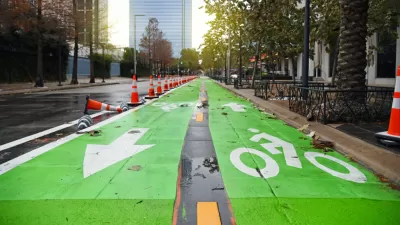Left behind in business-as-usual city planning processes: low income and racial minority residents who rely on biking for transportation.
Rachel Dovey examines a project recently completed by BikeHouston for lessons in how standard-practice city planning fails standards of social equity for cyclists.
According to Dovey, "[b]y gathering input along high-traffic routes for transit-dependent cyclists, the women behind BikeHouston’s targeted outreach program managed to demonstrate just how exclusive the business-as-usual cycle of notices, public forums and plan updates can be."
The project described helped gather public info for a revision of Houston's Comprehensive Bikeway Plan. "Instead of inviting cyclists to come to them," reports Dovey, "BikeHouston decided to meet riders where they were — specifically, along the Metro Red Line during late-night and early-morning commute hours."
Nabiha Hossain, then an intern with BikeHouston, spent the project interviewing cyclists for their opinions about bike safety. In addition to the typical kind of information one would expect to collect during a bike planning process, Hossain also reached a much larger realization: how completely standard-practice city engagement tactics seemed to be failing the cyclists she spoke with.
Dovey adds that other programs in East Los Angeles and San Francisco are also experimenting with new outreach methods to close the racial gap in bike planning practices.
FULL STORY: Why Business-as-Usual Bike Planning Fails Low-Income Cyclists

Maui's Vacation Rental Debate Turns Ugly
Verbal attacks, misinformation campaigns and fistfights plague a high-stakes debate to convert thousands of vacation rentals into long-term housing.

Planetizen Federal Action Tracker
A weekly monitor of how Trump’s orders and actions are impacting planners and planning in America.

Chicago’s Ghost Rails
Just beneath the surface of the modern city lie the remnants of its expansive early 20th-century streetcar system.

Bend, Oregon Zoning Reforms Prioritize Small-Scale Housing
The city altered its zoning code to allow multi-family housing and eliminated parking mandates citywide.

Amtrak Cutting Jobs, Funding to High-Speed Rail
The agency plans to cut 10 percent of its workforce and has confirmed it will not fund new high-speed rail projects.

LA Denies Basic Services to Unhoused Residents
The city has repeatedly failed to respond to requests for trash pickup at encampment sites, and eliminated a program that provided mobile showers and toilets.
Urban Design for Planners 1: Software Tools
This six-course series explores essential urban design concepts using open source software and equips planners with the tools they need to participate fully in the urban design process.
Planning for Universal Design
Learn the tools for implementing Universal Design in planning regulations.
planning NEXT
Appalachian Highlands Housing Partners
Mpact (founded as Rail~Volution)
City of Camden Redevelopment Agency
City of Astoria
City of Portland
City of Laramie





























